

The Conversation: In-depth analysis, research, news and ideas from leading academics and researchers. Academic Writing Blog. Advanced Academic Writing. PLOS Blogs Network. Following furry animals cross the road: and other adventures. Timeless Advice on Writing from Famous Authors. PubMed Commons - NCBI. Things of interest to a medical librarian. - Krafty Librarian. Things of interest to a medical librarian. - Krafty Librarian. Who are you writing for? 26 November 2013 by Jonathan O'Donnell Thanks to our sponsors, by Jonathan O’Donnell on Flickr Your grant application will probably only be read by half a dozen people who matter.
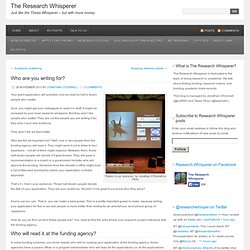
Sure, you might get your colleagues to read it in draft. It might be reviewed by your local research whisperer. But they aren’t the people who matter! They aren’t the six that matter. Bonne série d'articles sur la rédaction dans Journal of Clinical Epidemiology. Mission Statement. The Freshperson Problem – Lingua Franca - Blogs. Earlier this week, I had my copy-editor hat on and was working my way through a newsletter for a graduate program at the university.
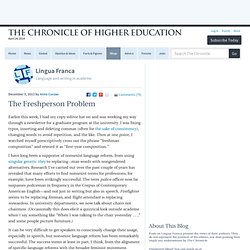
I was fixing typos, inserting and deleting commas (often for the sake of consistency), changing words to avoid repetition, and the like. Then at one point, I watched myself prescriptively cross out the phrase “freshman composition” and reword it as “first-year composition.” Stratégies de publication scientifique - Auteur Patricia Volland-Nail.
How to be a Hackademic #40 by Charlotte Frost & Jesse Stommel. Data Diving. TIP OF THE ICEBERG: Independent reviewers of clinical trial data have access to just a minuscule percentage of the actual information.Pushart TIP OF THE ICEBERG: Independent reviewers of clinical trial data have access to just a minuscule percentage of the actual information.
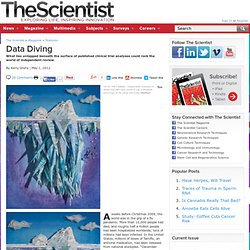
PUSHART A few weeks before Christmas 2009, the world was in the grip of a flu pandemic. More than 10,000 people had died, and roughly half a million people had been hospitalized worldwide; tens of millions had been infected. In the United States, millions of doses of Tamiflu, an antiviral medication, had been released from national stockpiles. So it was no small blow when, that same month, Doshi and his colleagues released their assessment of Tamiflu showing that there was not enough evidence to merit a claim that the drug reduced the complications of influenza.[1.
Statistiques. Moteur de recherche Search engine et références ou citations. Academic scattering. 19 November 2013 by researchwhisper Katie Mack has been training as a cosmologist since about the age of 10 when she decided she wanted Stephen Hawking’s job.
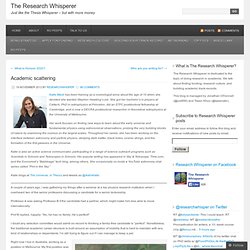
She got her bachelor’s in physics at Caltech, PhD in astrophysics at Princeton, did an STFC postdoctoral fellowship at Cambridge, and is now a DECRA postdoctoral researcher in theoretical astrophysics at the University of Melbourne. Her work focuses on finding new ways to learn about the early universe and fundamental physics using astronomical observations, probing the very building blocks of nature by examining the cosmos on the largest scales.
Throughout her career, she has been working on the interface between astronomy and particle physics, studying dark matter, black holes, cosmic strings, and the formation of the first galaxies in the Universe. Katie is also an active science communicator, participating in a range of science outreach programs such as Scientists in Schools and Telescopes in Schools. Equator > Home. E-health. Kean Birch: How to get published in academic journals. Last week I spent a frustrating hour or two refereeing a paper for an academic journal – I say frustrating because the paper had a kernel of something really interesting buried inside a morass of wordiness and theory-ness.
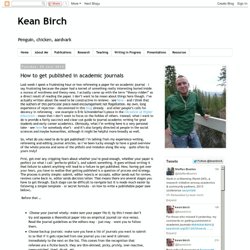
I actually came up with the term “theory-ridden” as a direct result of reading the paper. I don’t want to be mean about things here though. I’ve actually written about the need to be constructive in reviews – see here – and I think that the authors of this particular piece need encouragement not flagellation. My own, long experience of rejection – documented in this blog already – and other people’s calls for decency in refereeing – one example is Erik Schneiderhan’s piece in the Chronicle of Higher Education – mean that I don’t want to focus on the foibles of others.
Instead, what I want to do is provide a fairly succinct and clear-cut guide to journal academic writing for grad students and early career academics. So, what do you need to do to get published? Bad docs bad drugs. Hmaisonneuve. Professional Skills and Scholarliness. Rédaction publication scientifique. Rédaction publication scientifique. Lecture critique. Rédaction scientifique. Logiciels gratuits de recherche quali.
Why do academics choose useless titles for articles and chapters? Four steps to getting a better title. An informative title for an article or chapter maximizes the likelihood that your audience correctly remembers enough about your arguments to re-discover what they are looking for.
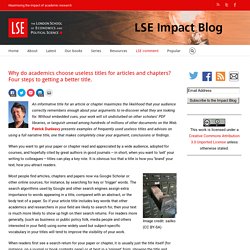
Without embedded cues, your work will sit undisturbed on other scholars’ PDF libraries, or languish unread among hundreds of millions of other documents on the Web. Patrick Dunleavy presents examples of frequently used useless titles and advises on using a full narrative title, one that makes completely clear your argument, conclusions or findings. When you want to get your paper or chapter read and appreciated by a wide audience, adopted for courses, and hopefully cited by great authors in good journals — in short, when you want to ‘sell’ your writing to colleagues — titles can play a key role.
It is obvious too that a title is how you ‘brand’ your text, how you attract readers. Image credit: sailko (CC BY-SA) Even after other researchers have found and read your text, titles remain important. About the Author. Why do academics choose useless titles for articles and chapters? Four steps to getting a better title. Site personnel de Philippe Cibois. Il s'agit d'un logiciel libre (précisions) de dépouillement d'enquête, librement reproductible.
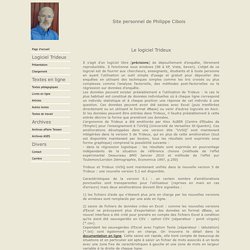
Il fonctionne sous windows (98 à XP, Vista, Seven). L'objet de ce logiciel est de fournir aux chercheurs, enseignants, étudiants et à toute personne en ayant l'utilisation un outil simple d'usage et gratuit pour dépouiller des enquêtes en utilisant des techniques simples comme les tris croisés ou plus complexes comme l'analyse factorielle, des méthodes post-factorielles ou la régression sur données d'enquête. Another look at Qualitative data analysis for Mac users: Dedoose. Home > Uncategorized > Another look at Qualitative data analysis for Mac users: Dedoose Technically I’m not meant to be looking at data analysis right now: it’s writing month, and the last thing I need to be doing is getting lost in data.
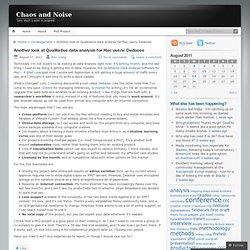
However, the Qualitative Data Analysis Software for Mac – A Brief Look post that I wrote last September is still getting a huge amount of traffic every day, and I thought it was time to write a quick update. What’s changed? Lots. AuthorAID: supporting researchers from developing countries. Designing conference posters » Colin Purrington. A large-format poster is a big piece of paper or wall-mounted monitor featuring a short title, an introduction to your burning question, an overview of your novel experimental approach, your amazing results in graphical form, some insightful discussion of aforementioned results, a listing of previously published articles that are important to your research, and some brief acknowledgement of the tremendous assistance and financial support conned from others — if all text is kept to a minimum (less than a 1000 words), a person could fully read your poster in 5-10 minutes.

Section content • DOs and DON’Ts • Adding pieces of flair • Presenting • Motivational advice • Software • Templates • Printing • Useful literature • Organizing a poster session What to put in each section Below, I’ve provided rough tips on how many words each of these sections might have, but those guesses are assuming you have a horizontal poster that is approximately 3×4′. Adjust accordingly. DOs and DON’Ts 1. 2. 3. Teaching Research. Academic Phrasebank.
Writing skills. Group blogs: BMJ. The BMJ Today: If you hear hoof beats in Texas think of horses, not zebras As Saurabh Jha writes, “The likelihood that someone with cerebral aneurysm hit by a bat develops subarachnoid hemorrhage (near certainty) is not the same as the likelihood that someone who develops subarachnoid hemorrhage after high impact trauma has an aneurysm, hitherto undisclosed (very low).”
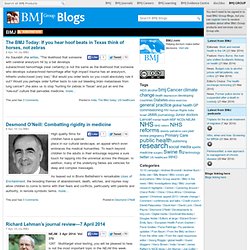
But would you order tests so you could absolutely rule it out? Would you perhaps order further tests to rule out bleeding brain metastases from lung cancer? Jha asks us to stop “hunting for zebras in Texas” and put an end the “rule-out” culture that pervades medicine. more… Rédaction Médicale et Scientifique. Attention, ce n'est pas la photo de O Voinnet. Depuis quelques mois, le cas de Olivier Voinnet, chercheur français détaché à Zurich (génétique des plantes), agitait la communauté scientifique.
Nous avions évoqué ce cas en attente des résultats des commissions d'enquête dont les résultats ont été publié le 10 juillet 2015. Le CNRS n'a pas communiqué pendant les investigations : BRAVO. Pour avoir l'historie complète, je vous conseille le site du journal Le Monde avec un article bien fait de H Morin et D Larousserie : "Olivier Voinnet, star de la biologie végétale, sanctionné par le CNRS". Le Blog de Georges Zafran. Embargo Watch. Retraction Watch.